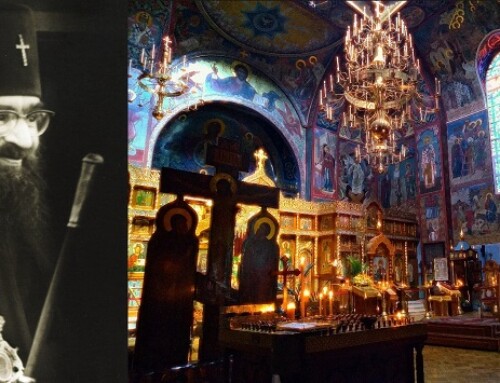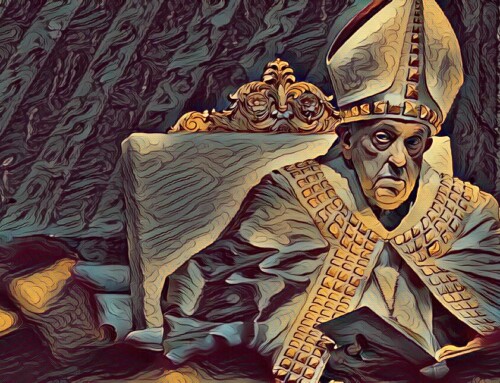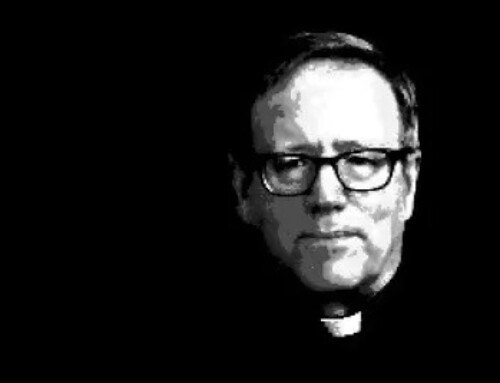Above: “The Icon Corner” by Vasily Maximov, 1869.
“On our earth we can only love with suffering and through suffering. We cannot love otherwise, and we know of no other sort of love. I want suffering in order to love.” – Fyodor Dostoyevsky
When I was a boy, I thought of my father as an enigma; he was mysterious. He came and went, sometimes early in the morning; sometimes in the middle of the night. He would collapse onto the bed and sleep for a few hours, then swallow a drink and some food and he was gone again. My dad was olive-skinned and dark-haired. I was a scrawny towheaded blond. He was focused and intense. He had the same hard-staring eyes of the icon he kept in his bedroom – a reproduction of “Our Lady of Perpetual Help.” That pictured scared me.
When I got older, I didn’t bother much with my father – I thought he was rather ridiculous. Away at college, when I came home – he still had that strange image of the Virgin Mary holding the Christ-Child; like when I was a kid, I walked by it rather quickly. When I dared to look up at it, I felt like a little boy again. What did I do wrong? I thought.
Then, I wasn’t living the best of lives. In a cry for help, or in a strange attempt to have my revenge – “Look what you made me into” – I oftentimes subconsciously made an effort to reveal my inner torment through my appearance: purple hair, bleached white hair, no hair…black leather clothes…tattoos and every bodily protuberance pierced and dangling a 12 gauge. I knew my father noticed, but like Our Lady in the icon, he didn’t say anything – he just looked. What I judged as a sign of condemnation was actually sorrow. While I thought my father was full of anger – I was actually the one who was filled with hatred.
“The face is a witness of the thoughts and is a silent interpreter of the heart. The outward appearance is often a sign of the conscience and the unspoken words of the mind.” – St. Ambrose
My father was a discipled man; though he wasn’t cheerless. He was someone who worked with his hands, but he was highly intelligent. I always equated blue-collar work with stupidity. Growing-up, along with what I regarded as his prehistoric devotion to an old icon, my father always kept a small statue to St. Joseph somewhere in the house. I had a peculiar reaction to that little figurine of a father holding his son; I was revolted. In a sense, it represented everything I truly desired – but in its purest form. Almost everything I encountered in the world of male homosexuality was a poor substitute for my heart’s deepest longing. Yet, I hated that which I idolized. Instinctively I lashed out at what I knew was true.
The only way to understand my feelings where to fetishize them; this was expertly realized by Madonna in the early-1990s when she methodically appropriated a form of traditional Catholicism that technically no longer existed except in small traditional enclaves: polychrome statues of the Saints; the stigmata; monks in robes; rosaries; and a life-changing union with the transcendent; in the process she stripped these images, devotions, and experiences of their original meaning and made them seemingly accessible through sex. I never found the profound embrace from the father in the gay male community. This dissatisfaction, and the subconscious realization that I had been left unfulfilled and broken-hearted, made me even more bitter.
“Think of those who hate the good, really because they hate their own wickedness!” – Archbishop Fulton Sheen
I don’t think I ever would have admitted that I had been wrong about so many things if God had never shown me exactly where my stubbornness was taking me – hell itself. Like a broken and beaten-down prodigal son, I returned home, literally leaving behind me a trail of blood. At that moment, when I walked into my parent’s home, the icon of the Madonna didn’t seem so judgmental; the statue of St. Joseph wasn’t as off-putting. For months, I sheltered in my room. At night, sometimes I’d sneak out into the kitchen. There, I could see my father in the living room. Illuminated only by a single votive candle – my father prayed before the image of Our Lady and a statue of St. Joseph. He prayed for several people – including me.
For the majority of my life – I didn’t know my father; and I didn’t try to get to know him. I kept my distance; while I was doing that – he prayed for me. As he got older, he worked less, went out less, and prayed more; daily – reciting all the mysteries of the Holy Rosary (twice). The vigorous man I once knew as a child became an almost shrunken old man. He was ill a lot with a variety of ailments; some of them rather minor and inconvenient – others were life-threatening. Yet, in his constant suffering, he was able to maintain a certain measure of peace. How? Through prayer and the power of redemptive suffering.
“The lot of all those who wish to be saved – is to suffer. Therefore, if we suffer then let us rejoice, for our salvation is being carried out.” – St. Nikon of Optina
Years later, without knowing it, I have become more and more like my father; at one time in my life, that reality would have been more loathsome than death. In my home, as he did, I have set-up a little corner of the room as a place of prayer. There, I have an icon of Our Lady, a votive candle, and a statue of St. Joseph. Usually at night, like my father, I sit before this homemade shrine.
Although I haven’t asked for such things, suffering has come to me – both physical and mental. Once, when I was undergoing a series of cardiovascular tests, due to my declining health, a doctor discovered that I had atrial fibrillation. Having previously diagnosed my father with the same condition, he said: “Your sinus rhythm is exactly like your dad’s.” I thought, Gee – thanks dad. From that point onward, I went through a cascade of health problems. I didn’t gladly embrace the suffering involved. During much of that time, I rarely prayed. Without the pending urgency of a wayward son who was constantly dancing at the edge of damnation, I was prone to be completely self-centered and spent countless days ruminating on my own misery. I wasted precious time. But almost simultaneously, when not preoccupied with self-pity, I noticed that my father was going through his own struggles with physical illness; but like many of those who suffer in near-silence, his suffering was difficult to detect; in fact, I later learned, that much of my father’s life had been an exercise in withstanding extreme levels of pain. I think, during a certain period in his younger years, he tried to numb this agony. But, later, he accepted it.
“Life is suffering…” – Jordan Peterson
Today, I am still struggling to accept suffering in the way my father was able to do. In these times of sheltering in place, my life has mirrored the final years of my dad: I am at home the majority of the time; I am in a lot of pain; and I have little to do – so, I pray. I am watching the Mass on television or the internet; my father never missed the daily Mass on EWTN. Unlike when I was young and reckless, I have a wider and more diverse group of extended family and friends. Some of them – as I once did – have gone far astray; others, that I continue to love from my previous existence, are still seeking a spiritual embrace from a phantom man who will never materialize – except in the Body of Christ. In the best way I know how, I have tried to reach out to them. Some, will no longer speak to me; as I once did to my father. Then, I have little recourse – I pray. Thanks dad.





Joseph, your writing always touches me. What a testimony to your dad. It’s moving to imagine how he must have prayed, like Monica, for his wayward boy, probably never imagining the man he would turn out to be. I believe your Dad has passed. If so, I often think that a few things may make it to our loved ones in heaven, and the conversion of a child seems like one of those things. Or, when we face the judgment, it seems probable we learn the bad effects we have had and the good, and your conversion in part due to his good example would be something he would learn then, or at least, this seems possible.
It’s a beautiful thing, you having your similar home altar. What repelled you then, draws you now, incredible.
I have a great many family members who are somewhat unchurched. I try to be encouraging about their faith. Maybe even though I don’t see the fruit from that, it will show up, please God.
God bless you dear.
Thank you so much for your honesty and your faith. My mother was the one who prayed for me while I had very little respect for her and her faith, but her prayers, I’m convinced, brought about a vocation to the traditional priesthood in our family. One of my sons is a Benedictine monk at a monastery in Silver City NM. It is hard to live with the fact that others have suffered for our salvation, and I appreciate your willingness to talk about it. God is so good. God bless you and your work of faith.